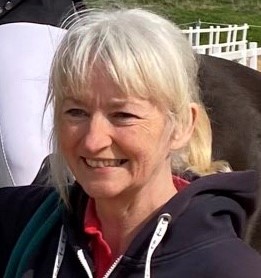Debbie was told she had advanced cancer after two visits to A&E for intense pain, followed by a CT scan. But a long wait to determine her exact diagnosis delayed the start of treatment and left her in a desperate place. Debbie is now a supporter of our #CatchUpWithCancer campaign – which pushes for every UK patient to be treated on time. Warning: this article contains references to suicide and cancer diagnosis delays that some readers might find upsetting.
 After years of good health, Debbie began experiencing intense pain in her liver in late 2022, aged 60. The nurse at her GP surgery suspected gall stones. When the pain got worse, Debbie went to her local Accident and Emergency department.
After years of good health, Debbie began experiencing intense pain in her liver in late 2022, aged 60. The nurse at her GP surgery suspected gall stones. When the pain got worse, Debbie went to her local Accident and Emergency department.
Debbie said: “The first time they thought it must have been pain from a muscle exertion, but I knew I hadn’t exerted myself. I went back to A&E after I reached for an item in a shop and the pain was agony. I couldn’t walk or move properly. From the second visit they started to take me seriously. The doctor said they had to respect the pain I was feeling and scheduled a CT a few days later, which showed lesions on my liver and spine.”
Hearing you have cancer, alone in a corridor
Debbie was then told she had cancer. But the abrupt manner of the healthcare professional, and the lack of information, left her reeling.
She explained: “A few hours after the CT, alone and in a corridor, I was told it was ‘obviously cancer’ but was given no further information and was left feeling numb. I think I stayed really calm and rational but in hindsight that was a very tough way to hear the news and be left with no answers.”
After the CT scan on December 5th, Debbie waited until February 17th to get a full diagnosis and start treatment. NHS targets state that patients should be treated within 62 days of an urgent referral for cancer. For Debbie, the delays were torture.
She said: “The waiting was terrible. I love my life but I thought about suicide because I just wanted this massive uncertainty to end. When I was told it was cancer, with no other information, I thought I’d be dead by Christmas. I did not want to end my life, but I wanted the pain and uncertainty to stop. I felt like I aged 20 years from the stress of it.
“In total, I was put on a two-week wait for the next lots of tests five times, when they knew I had Stage 4 cancer. Each test, except for one, could have been done at the same time. The result was a three-month wait as my cancer spread.”
A diagnosis at last
“I was finally booked in for a liver biopsy at the end of January 2023 which showed Stage 4 metastatic lobular breast cancer. It was incurable but treatable. I was so happy to know what it was and begin hormone suppression treatment in late February. This was followed by targeted therapy in tablet form and an injection to preserve my bones. That March I had a baseline scan and the tumours had already shrunk.
“I was almost gleeful to get a full diagnosis. It was really strange for others to see me be ‘happy’ about Stage 4 breast cancer, but it meant I knew what it was and could start treatment.”
Living with cancer
Debbie concluded: “Treatment will stop when I die.
“My case is not straightforward, but nonetheless it has been hellish. I have no wish to criticise any individual staff as, on the whole, I believe everyone has done their best. It’s systemic change that is so badly needed. Since diagnosis I have nothing but praise for the compassion shown to me, but it was a rocky road to get there.”
Today, Debbie is a keen advocate for patients and patient services. She also volunteers to review patient information for Radiotherapy UK, and was a guest speaker for one of our RTUK Talks: What Matters to Patients? Important conversations about life, death and everything in between
Debbie’s RTUK Talks presentation can be seen (HERE) from minute 17 of the recording.
